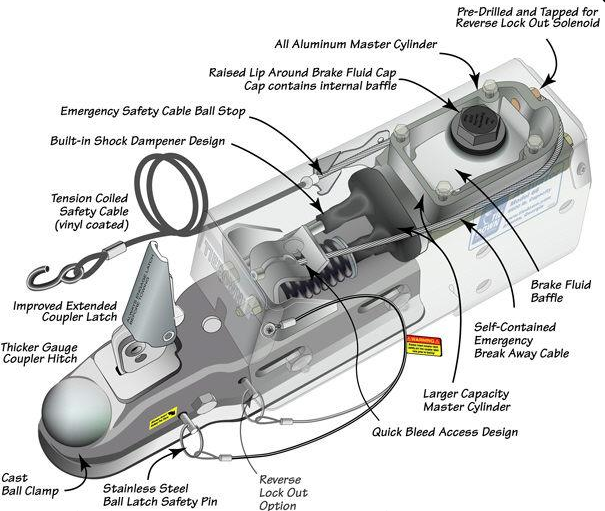Ditch the Surge: Your Guide to Electric Brake Conversions
Tired of the jerky stops and maintenance headaches that come with surge brakes on your trailer? You're not alone. More and more trailer owners are making the switch to electric brakes, and for good reason. This comprehensive guide dives deep into the world of surge brake to electric brake conversions, offering everything you need to know to decide if this upgrade is right for you.
Imagine smoother stops, improved control, and increased safety while towing. That’s the promise of electric brakes. Switching from a surge brake system to an electric braking system might seem daunting, but with the right information, it can be a manageable and rewarding upgrade for your trailer.
Surge brakes, while a common and relatively simple system, rely on the momentum of the trailer pushing against the tow vehicle to activate the brakes. This can lead to less predictable braking, especially in situations requiring quick stops or when navigating downhill slopes. Electric brakes, on the other hand, offer a more controlled and responsive braking experience. They operate independently of the tow vehicle's braking system, providing a smoother and more consistent stopping power.
The shift towards electric brake systems has gained momentum in recent years due to advancements in technology and a growing demand for improved trailer safety and performance. This transition offers numerous benefits, from enhanced braking control to reduced wear and tear on both the tow vehicle and the trailer. Electric brake conversions involve replacing the surge actuator with an electric brake controller and wiring the trailer brakes to the tow vehicle's electrical system.
Historically, surge brakes were the go-to solution for trailer braking due to their simplicity and cost-effectiveness. However, as trailers have become larger and towing speeds have increased, the limitations of surge brakes have become more apparent. This has driven the increasing popularity of electric brake conversions, making them a sought-after upgrade for many trailer owners.
One key advantage of transitioning to electric brakes is the enhanced control they provide. Unlike surge brakes, which react to the momentum of the trailer, electric brakes can be activated independently, giving the driver more precise control over braking force.
Another benefit is the reduced wear and tear on the tow vehicle. Since electric brakes operate independently, they lessen the strain on the tow vehicle's braking system, potentially extending its lifespan.
Finally, electric brakes generally lead to a smoother and more predictable stopping experience, contributing to increased safety while towing.
Advantages and Disadvantages of Surge to Electric Brake Conversion
| Advantages | Disadvantages |
|---|---|
| Improved Braking Control | Higher Initial Cost |
| Reduced Wear and Tear | More Complex Installation |
| Smoother Stopping | Requires a Brake Controller |
Best Practices for Electric Brake Conversions:
1. Choose a quality brake controller compatible with your tow vehicle and trailer.
2. Ensure proper wiring and grounding to prevent electrical issues.
3. Test the brake system thoroughly after installation.
4. Regularly inspect and maintain the electric brake components.
5. Consult a professional if you're unsure about any aspect of the conversion process.
FAQs about Surge to Electric Brake Conversion
1. Q: Is an electric brake conversion worth the cost? A: While the initial investment is higher, the long-term benefits often outweigh the upfront expense.
2. Q: How long does the conversion typically take? A: The conversion process can vary depending on the trailer and the installer's experience, typically ranging from a few hours to a full day.
3. Q: Do I need any special tools for the conversion? A: Basic hand tools and some electrical connectors are typically required.
4. Q: Can I perform the conversion myself? A: While possible for those with mechanical and electrical experience, it's recommended to consult a professional for a safe and reliable installation.
5. Q: What type of maintenance is required for electric brakes? A: Regular inspection of the wiring, brake magnets, and controller is essential.
6. Q: Are electric brakes better for heavier trailers? A: Yes, electric brakes are generally more suitable for heavier trailers due to their superior stopping power.
7. Q: How do I choose the right brake controller? A: Consider the type and weight of your trailer when selecting a brake controller.
8. Q: Where can I find a qualified installer? A: Check with local trailer dealers or RV service centers for recommendations.
In conclusion, converting from surge brakes to electric brakes is a significant upgrade that can drastically improve your towing experience. The benefits of enhanced control, reduced wear and tear, and smoother stopping contribute to a safer and more enjoyable journey. While the initial cost might seem daunting, the long-term advantages, including increased safety and potentially lower maintenance costs, make this a worthwhile investment for many trailer owners. If you're looking to enhance your towing safety and performance, exploring the possibilities of an electric brake conversion is a step worth taking.
Unlocking bloxburg build mode duplicating designs furniture
Unlocking the power of small trailer wiring harnesses
Hometown iga leitchfield ky your community grocery store














